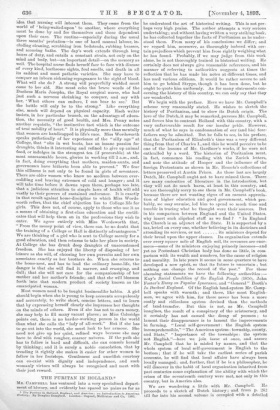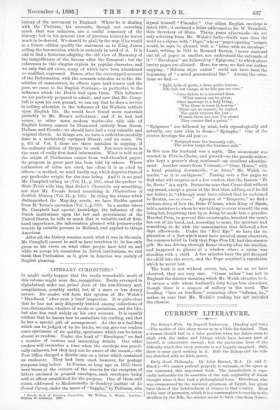THE PURITAN IN HOLLAND.* Mn. CAMPBELL has ventured into a
very specialised depart- ment of history, and evidently has spared no pains as far as The Puritan in ZioUand, EngIan d, and America : an Introduction to American ritetorii., By Douglas Oampboll. London : Osgood, Merbraino and Do. 18®5. he understood the art of historical writing. This is not per- haps very high praise. The author attempts a very serious undertaking ; and without having written a very striking book, he has collected together the facts of Puritanism as he under- stood them. From many of his conclusions we differ ; and we regard him, moreover, as thoroughly imbued with cer- tain prejudices which prevent him from rightly weighing what he has found. Probably, if we may judge from this work alone, he is not thoroughly trained in historical writing. He certainly does not always give reasonable references, and his manner of referring to authorities suggests at times the reflection that he has made his notes at different times, and has used various editions. It would be rather severe to ask him to go behind Strype, though it has been done, but he ought to quote him uniformly. As for many statements con- cerning the history of this country, we can only say that they are wonderful.
We begin with the preface. Here we have Mr. Campbell's scheme very reasonably stated. He wishes to sketch the history of Puritanism, and to show its Dutch origin. The love of the Dutch, it may be remarked, pursues Mr. Campbell, and forces him to contrast Holland with this country, with a very unfavourable result for our insular pride. However, much of what he says in condemnation of our (and his) fore- fathers may be admitted. But he fails to see, in his preface, that the Puritanism of Elizabeth's time was a very different thing from that of Charles I., and this he would perceive to be one of the lessons of Mr. Gardiner's works, if he were not enthralled by a word. The historian of Puritanism must, in fact, commence his reading with the Zurich letters, and note the attitude of Hooper and the influence of the foreign Protestants as shown in Mr. Hessels's collections of letters preserved at Austin Friars. As these last are largely Dutch, Mr. Campbell ought not to bare missed them. There are many curiosities of literature in the introduction, but they will not do much harm, at least in this country, and, we are thoroughly sorry to see them in Mr. Campbell's book, because there are not wanting signs of an earnest apprecia- tion of higher education and good government, which pro- bably, we may surmise, led him to spend so much time and trouble in. tracing what he thought were their sources. But in his comparison between England and the United States, why insert such slipshod stuff as we find ? " In England the Church is an adjunct of the State. It is supported by a tax, levied on every one, whether believing in its doctrines and attending its services, or not its ministers depend for their bread upon the upper classes. Its organisation extends over every square mile of English soil, its revenues are enor- mous—some of its ministers enjoying princely incomes—and yet no Protestant Christian body has done so little, in cons parison with its wealth and numbers, for the cause of religion and morality. In late years it seems in some quarters to have developed a new spirit, so that its future is uncertain ; but nothing can change the record of the past." For these alarming statements we have the following authorities :- Kay's Social Condition, of the English People (1850), John Foster's Essay on .Popular Ignorance, and " General " Booth's In Darkest England. Of the English land-system Mr. Camp- bell speaks with warmth ; and there, like most English- men, we agree with him, for there never has been a more costly and ridiculous system devised than the methods of land-transfer. But this is not, as Mr. Campbell imagines, the result of a conspiracy of the aristocracy, and it certainly has not caused the decay of yeomen ; to lament their disappearance is to lament the improvements in farming. " Local self-government : the English system incomprehensible," " The American system : township, county, and State," " Importance of the townships : the system not English,"—here we join issue at once, and assure Mr. Campbell that he is misled by names, and that the whole system of local self-government is English to the bottom ; that if he will take the earliest series of parish accounts, he will find that local affairs have always been locally managed ; and, farther, that if he is a philosopher, he will discover in the habit of local organisation inherited from past centuries some explanation of the ability with which the crises of the seventeenth century were met, not only in this country, but in America also.
We are wandering a little with Mr. Campbell. He proceeds to a sketch of Dutch history ; and from p. 262 till far into his second volume is occupied with a detailed history of the movement in England. Where he is dealing with the Puritans, his accounts, though not revealing much that was unknown, are a useful summary of the history; but in his general view of previous history he leaves much to be desired. We should be glad, by.he way, if he would in a future edition qualify the statement as to King James selling the baronetcies, which is certainly in need of it. It is odd to find a historian adopting the old view of Macaulay of the insignificance of the Saxons after the Conquest; but the references to this chapter explain its popular character, and we only find old views, many of which have been abandoned or modified, expressed. Hence, after the stereotyped account of the Reformation, with the common mistakes as to the dis- solution of monasteries, its effects upon land-tenure and the poor, we come to the English Puritans,—in particular, to the influence which the Dutch had upon them. This influence we are perfectly prepared to admit; and now that Mr. Camp- bell is upon his own ground, we can say that he does a service in calling attention to the influence of the Walloon settlers upon English life. He would have found more materials probably in Mr. Moen's collections ; and if he had had access to other more modern works—for this side of English history cannot be illustrated entirely from Green, Hallam, and Fronde—we should have had a very valuable and original sketch. As things are, we have a collection carefully done in a moderately equipped library, and no more. On p. 455 of Vol. I. there are three mistakes in copying, if the ordinary edition of Strype be used. But more serious is the want of really first-hand information. What is told us of the origin of Puritanism comes from well-thumbed pages ; its progress in great part has been told by others. Where authorities of value are cited, too often it is as cited by others,—a method, we need hardly say, which deprives them of any particular weight for the time being, And it is no good Mr. Campbell telling us (Vol. II., p. 191), what the preface to State Trials tells him, that Baker's Chronicles say something, nor that Mr. Fronde found something in Illustrations of Scottish History (Vol. IL, p. 141). In citing the abuses which distinguished the May-day revels, we have Stubbs quoted from M. Taine's quotation (Vol. I., p. 350). In a matter where Mr. Campbell had special knowledge, the influence of the Dutch institutions upon the law and government of the United States, he tells us much that is valuable and of first- hand importance, the information gleaned with praiseworthy trouble by suitable persons in Holland, and applied to things American.
After all, the history remains much what it was in the main. Mr. Campbell cannot be said to have rewritten it; he has only given us his views on what other people have told us, and while we accept his researches in Dutch institutions, we still think that Puritanism as it grew in America was mainly of English planting.





















































 Previous page
Previous page